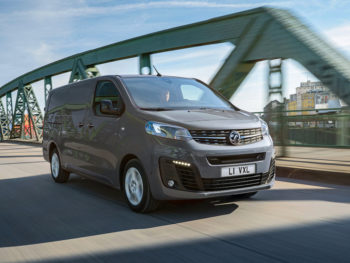UK light commercial vehicle registrations grew for the second consecutive month in February, rising to 17,540 units.

February is typically a volatile month as many operators delay procurement until March and the arrival of the new number plate – but the 8.5% increase seen last month marked the best February performance since 1998; the year before the bi-annual plate change was introduced.
The jump in registrations was the result of pent-up demand after registrations fell 20.6% last year due to the much-documented semiconductor supply chain issues.
The rising deliveries were driven by demand for large vans, increasing by 14.0%, and small vans, up by 5.2%.
Conversely, medium-sized vans fell by 16.5%, reflecting the broader long-term trend towards larger units.
The pickup and 4×4 utility segments both saw double-digit growth, up 42.3% and 90.8% respectively. But these are historically smaller volume segments and far more open to fluctuations.
Deliveries of battery electric vans fell 44.5% to 966 units – but the SMMT noted this was compared to a particularly strong February in 2022. It also highlighted that February’s traditionally smaller volumes tend to underscore the cyclical nature of fleet investment.
Year to date, overall LCV registrations are up by 17.5% on the same period in 2022 and by 5.3% on the first two months of 2020 – used as a pre-pandemic comparison.
The SMMT said the rise showed demand for these critical vehicles from key sectors.
Mike Hawes, SMMT chief executive, said: “Following a torrid 2022, the UK van market is returning to sustained growth that is exceeding even pre-pandemic levels. Given the importance of vans to keeping the British economy and society on the move, this growth is good news.
“With the ZEV market still at a very early stage, however, a concerted effort by all stakeholders to accelerate van-suitable charge point installation must become an urgent priority, enabling long-term net zero fleet investment at the scale necessary.”
Ford’s Transit Custom and large Transit took first and second position this year, followed by the Vauxhall Vivaro in third position.
Sue Robinson, chief executive of the National Franchised Dealers Association (NFDA), said: “It appears that business customers who order vans are making their decision based on price, value, and practicality to offer the best weight and range capacity available.”
She added: “Whilst February’s registration figures are typically restrained due to customers holding off on committing to a new van before March, to benefit from the new ’23 prefix number plate, it is extremely positive to see such strong registration figures.
“Dealers are optimistic with demand for light commercials under 3.5 tonne and, hopefully, with the easing of supply there should be more new vans readily available for customers. With the continued growth in online business, LCV appetite will remain robust.”
Vauxhall has also published its own registrations data, showing the Vivaro Electric was the UK’s best-selling e-LCV in February with 264 sold, followed by the Combo Electric with 115 units.
The brand said its electric vans account for one in four (25.6%) sold in 2023 so far, as a result of it being one of only a few manufacturers to offer an electric version across its entire line-up.
James Taylor, managing director, Vauxhall, said: “We expect the electric van market to continue growing this year on the back of two years of brilliant success for Vauxhall in this segment. More and more businesses are switching to electric to reduce overheads and costs, as well as to reduce their carbon footprint.”

